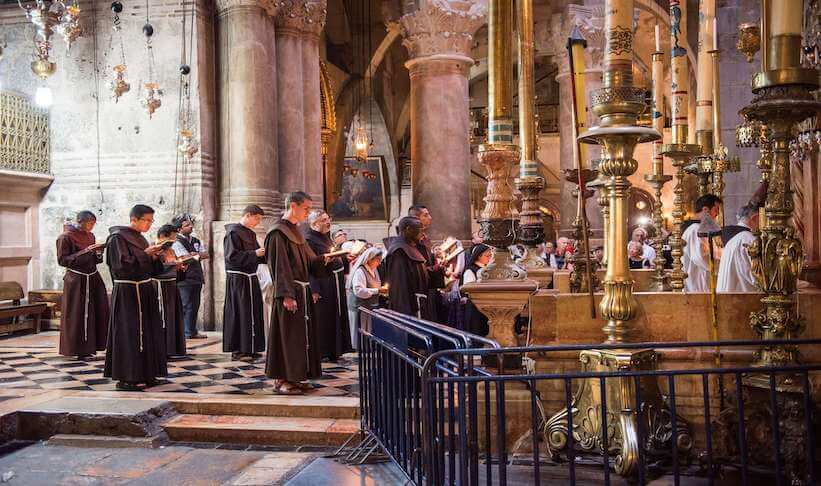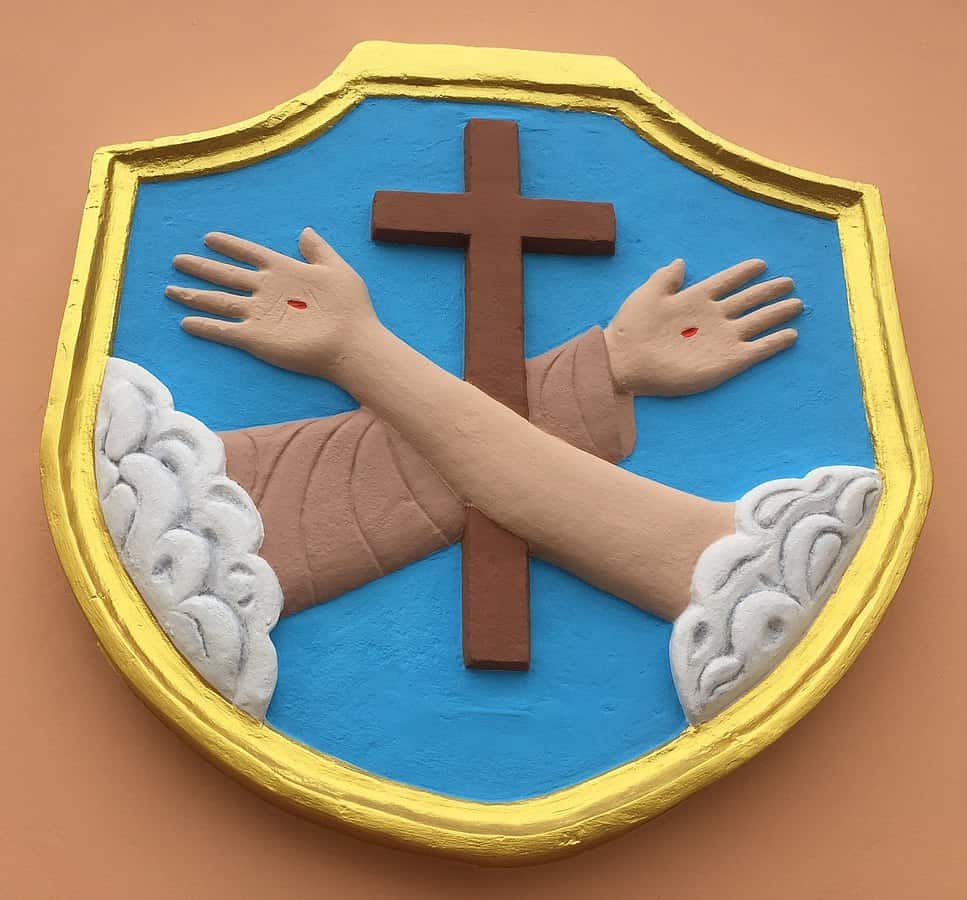What Is Franciscan Theology? History, Beliefs & Spirituality

Ask a room full of Franciscans what defines them, and you may get a wide range of answers. Unlike other Catholic orders or charisms, there is no one way to embody the legacy of St. Francis of Assisi — and it’s this unique and personal quality that draws vowed and secular followers to this day.
What Is a Franciscan?
While Franciscan theology can refer to a wide range of principles, Franciscan spirituality generally aligns with the teachings of St. Francis and St. Clare of Assisi.
Franciscans include priests, sisters, brothers, and lay people. The manifestation and expression of Franciscanism varies widely, but all Franciscans uphold the same values of their charism, or spiritual gift: charity, selflessness, kindness, humility, asceticism, and a love of all creation. The Franciscan motto is pax et bonum, which means “peace and all good.”
Being a Franciscan can mean being a member of one of three orders within the Catholic Church, all founded by St. Francis of Assisi during his lifetime in the 12th and 13th centuries. Please note that each of these orders has multiple divisions within it.
- Order of Friars Minor (OFM): Founded in 1209, this brotherhood practices communal living, radical asceticism, and a ministry that upholds education and charitable works.
- Order of Saint Clare (Poor Clares): Founded in part by Clare of Assisi in 1212, the Poor Clare sisterhood upholds the principles of simplicity, community, and joy.
- Third Order of Saint Francis: This order, founded initially in 1221, was eventually divided into religious and secular orders, both of which minister in the world as St. Francis did. The Secular Franciscan Order is open to Catholic men and women who live in the secular world, while religious members of the Third Order may live in communities of men or women.
The global Franciscan community (lay and religious) cites the heritage or tradition offered by many Franciscans throughout the centuries, all of whom represent the diverse ways of living out the charism. Besides Francis and Clare of Assisi, noted scholars and teachers include St. Elizabeth of Hungary, St. Anthony of Padua, and St. Bonaventure.
Franciscans do not place strong emphasis on original sin and atonement, but rather focus on finding joy in all of creation and the opportunities it provides, as St. Francis did in his lifetime. Franciscan theologians were considered intellectual masters in the Middle Ages, and maintain a strong affinity for education and intellectual ministry to this day. As such, there are many schools and universities with ties to Franciscan orders.
St. Francis of Assisi & the Origin of Franciscan Theology
Today, St. Francis is widely known as the patron saint of ecology, animals, merchants, and the country of Italy, among other things. He is also associated with poor and marginalized populations, as well as acts of radical charity that included renouncing all worldly possessions to clear room for Christ’s presence.
Legacy aside, it bears remembering that Francis was a real person with misgivings, flaws, and lapses of faith. Born in Assisi, Italy, in 1181 or 1182, Francesco di Pietro di Bernardone was the son of a wealthy merchant who, at the age of 25, left his life of privilege behind to pursue a modest religious life. He would spend months at a time in the wilderness around his hometown, returning to civilization to preach compassion and repentance and live among the poor and sick. Along the way, he gained like-minded followers who eventually became the first Order of Friars Minor.
The first Franciscan brotherhood lived by rules of poverty, meaning that they did not own any personal possessions, begged for their food, and shared everything they acquired. They lived communally and even without shelter, seeking refuge in or outside churches wherever they traveled. In 1209, Francis and his brothers received permission from Pope Innocent III to formally establish their new order. Francis died in 1226, and was canonized in 1228.
Francis experienced ongoing conversion throughout his entire life, which made him an all-too-human representative of Christ. This quality still roots all Franciscans in perpetual curiosity, questioning, and a lifelong intellectual pursuit of understanding one’s faith.
Franciscans uphold St. Francis’ approach to simplicity to reflect the life of Jesus Christ, who is represented in the Franciscan coat of arms:

This symbol depicts two arms, palms open, held outstretched over a Tau cross. The right arm belongs to Jesus and bears a crucifixion wound, while the left belongs to St. Francis and bears a stigmata.
Franciscan Spirituality & Core Beliefs
“The Rule and Life of the Lesser Brothers is this: to observe the Holy Gospel of Our Lord Jesus Christ.” –St. Francis’ Rule
In following the teachings of St. Francis, Franciscan Catholics believe that God is generous and loving and that we are all created in his image.
A simple explanation of St. Francis’ life and legacy might describe him as:
- A saint of peace and the poor
- A saint with a great love for all God’s creatures
- Respectful of each person’s God-given uniqueness
Of course, there is much more to the Franciscan tradition and identity, but newcomers should know that Franciscans emphasize the goodness of God and creation — including people — above all else. As members of any Franciscan order can attest, every Franciscan experience is different. This, one might argue, is what makes Franciscan spirituality so unique within the Catholic faith, since it leaves room for personal interpretation.
According to Br. Casey Cole, OFM, of Breaking in the Habit, discussions of Franciscan theology may include topics like:
- Absolute freedom of God’s will over intellect or reason
- The absolute primacy of Christ (had Adam and Eve not sinned, would Jesus Christ still be incarnate?)
- A focus on creation
- Creation as the manifestation of God’s love for us
- An incarnational worldview that says God is present in the material world
- Coming to know God’s love through study of the outside world
- Divine immanence (i.e., God is closer to us than we are to ourselves)
- Truth found in personal experience
- The embodiment of faith as an action or service, rather than an intellectual exercise
The Franciscan Way of Living
The “Franciscan Difference” can be described as an approach to faith from a place of simplicity and compassion. There is no one way to live or minister as a Franciscan. While the Jesuits may act as global missionaries and the Benedictines may devote themselves to hospitality, Franciscans fulfill their charism by whichever means to which they are called at baptism.
Followers of St. Francis often look to Laudato si’, Pope Francis’ encyclical letter that addresses humankind’s responsibility to care for all creation. In this text, Pope Francis addresses climate change directly, connecting the urgency of both social justice and environmental advocacy. Laudato si’ (a phrase from St. Francis’ Canticle of the Creatures, which translates to “care for our common home”) introduces the concept of “integral ecology,” implying that care for our planet and care for each other are fundamentally intertwined.
Service to others, especially those on the margins of society, is central to Franciscanism. In OFM communities, Franciscan brothers live, pray, and work together in return for “whatever is necessary for the bodily support of themselves and their brothers.” Franciscan friars also work alongside members of secular society, as teachers, musicians, chaplains, writers, speakers, and more. This communal yet integrated way of living fulfills St. Francis’ vision for his own brotherhood during his life.
In short, Franciscans don’t subscribe to one way of thinking, living, or approaching theology. Franciscans follow the path of Jesus Christ, living as he might have lived, and their study of theology is personal and experiential. Their strong intellectual tradition is tempered by the condition that no amount of study should impede prayer and spiritual devotion.
The FST Difference: Education Rooted in Franciscan Tradition
Since its 1968 founding as a graduate theological school in Berkeley, California, the Franciscan School of Theology (FST) has embraced a vibrant academic tradition of responding to current realities of Western society. Today, FST is a San Diego-based seminary and theological school that prepares lay men, lay women, and men bound for the priesthood for ministry in the Roman Catholic Church.
Not ones to shy away from challenging questions, instructors and students at FST examine how cultural and social developments affect individual and communal faith practice. Each academic degree program takes a multicultural, inclusive, and optimistic approach to modern Catholicism, embodying St. Francis’ respect for all humankind. FST professors use Pope Francis’ Laudato si’ and St. Francis’ Canticle of the Creatures to discuss integrating care for creation into our contemporary world. While FST welcomes students of all faiths and backgrounds, the study of scripture, systematic theology, liturgy, and pastoral ministry are all rooted in Catholicism and the Franciscan tradition.
FST is the only Franciscan seminary and theological school in the U.S. that offers a Master of Divinity, and it shares a unique partnership with the University of San Diego. Students can take advantage of USD’s graduate programs in justice, nonprofit management, counseling, education, and more as they pertain to their ministerial studies. Seminarians and lay students alike can also enhance their studies through communal spiritual formation, including prayer groups, retreats, and more.
Students come from all walks of life to partake in the experiential learning environment that FST offers — truly walking in the footsteps of St. Francis. To learn more about the Franciscan Difference, and to explore graduate or continuing education opportunities, visit our program page or reach out to an enrollment advisor today.

